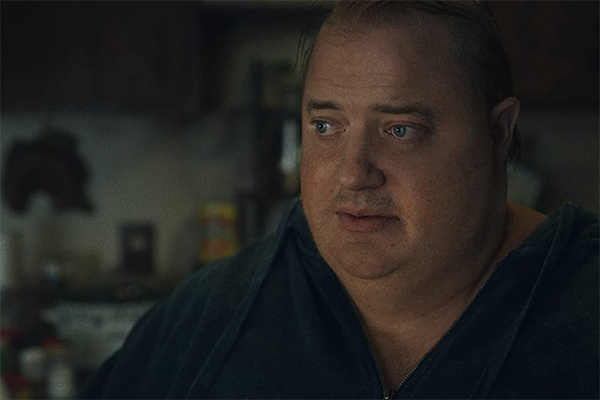
'The Whale' exceeds its bounds
By Martha K. Baker
"The Whale" is not what you think. Yes, "The Whale" is the tale of a morbidly obese man, but it is so much more. Significantly, "The Whale" is about words and writing, teaching and fathering, eating and essaying. The film is a tight and poignant homage to friendship and love with words ebbing like waves on the shore.
Charlie has let himself go after someone crucial to him died. He looks like the sofa on which he is ensconced. From that seat, he teaches on-line writing classes -- without video so his students cannot see him. He tutors them to "think about the truth of your argument." To get off that sofa, for Charlie to effect verticality, requires great grunts and groans, accompanying winces of pain. He orders pizzas delivered for his supper but invisibly leaves payment in the mailbox. He inhales the pies.
Liz, a friend who's a nurse, visits daily. Terribly worried about him, she is trying to save him from himself. A new visitor, an evangelist, tries to sell Jesus as savior. Then at the door appears Charlie's daughter, Ellie, who needs help writing about Walt Whitman, for which she has leaned on Wikipedia. She's spitting mad at Charlie for, she says, abandoning her when she was eight. Before the gathering is over, his ex-wife enters his lair -- one more bossy woman.
That Charlie remains in the center of this group speaks to the film's origin as a play by Samuel D. Hunter, who wrote the tight, poignant screenplay, which includes arguments against organized religion and for integrity. Both play and script honor Aristotle's unities. Woven through are voice-over lines that signify to Charlie. Darren Aronofsky honors the story with direction that is equally tight, with flashbacks that extend the play's settings. Camera angles focus on faces, which film can do in a way diluted in plays. Especially heart-breaking is Liz's face as she watches Charlie.
Hong Chau ("The Menu") is a wonderful Liz, and Sadie Sink ("Stranger Things") plays the troubled teenager as if she's been one. Ty Simpkins handles the complexities of the doubting Thomas. The admirable Samantha Morton, fresh from "She Said," brings sympathy to the role of Mary, the ex-. Ruling this cast is Brendan Fraser. He magnificently defines Charlie within the rubber of the character's obesity. It's difficult to watch Charlie wolf down his pizza, but it's not hard to follow his heart and mind, especially in his soliloquy to Mary.
"The Whale" extends Herman Melville's message of obsession to Charlie's of connection.


